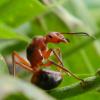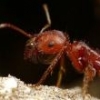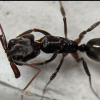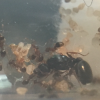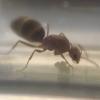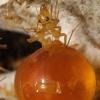I'm hoping someone can give me an idea what is happening here. I have 9 Camponotus floridanus queens, each with between 4-8 workers. Yesterday, a worker from Colony #7 went into seizures/spasms and died after a few hours. Today 3 more are also having spasms from the same colony. The others are all doing well.
The only thing different about this colony from the other 8 is the formicarium. The others are in tubs and tubes, but this one is in a plexiglass formicarium that I ordered off the internet. They have been in here for a couple of weeks and seemed to be doing quite well until now. They have been eating cockroach legs, mealworms and honey water. All colonies have received the same and none have died.
- Video #1 (in the formicarium) https://youtu.be/UhXjuPP5_RE
- Video #2 (after I removed them to a tube) https://youtu.be/gAlTsWIJc7A
Any clue as to what this is? My first thought was poison, but why only this one? It is almost entirely enclosed while the others are in tubs without lids so something in the air should have gotten them first.
Help!
Edited by MrKotter, September 5 2019 - 5:20 PM.






